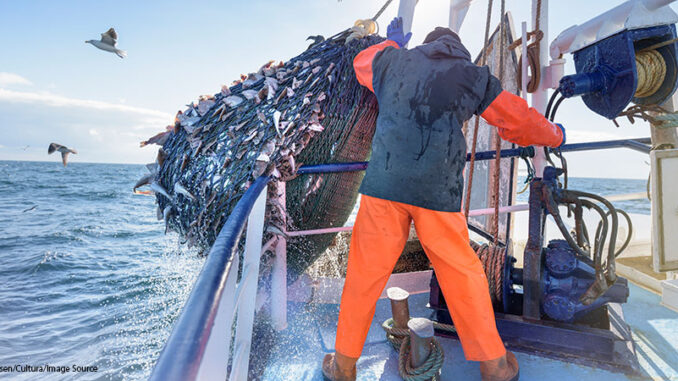
Fishermen vs. Fossil Fuels
While there is a great deal of proof that fossil fuel emissions have dire consequences for the environment–including contributing to climate change–oil, gas, and coal companies have been causing other environmental impacts as well–according to some in the fishing industry. Last month a group of fishermen in California and Oregon, called The Pacific Coast Federation of Fishermen’s Associations, filed a lawsuit against thirty fossil fuel companies for rising ocean temperatures. These fishermen say that the rising ocean temperatures caused by the fossil fuel companies caused a great deal of damage to a major West Coast Dungeness crab fishery and are taking a dramatic toll on the fishing industry.
The fishermen say that fossil fuel production leads to rising sea temperatures. Rising sea temperatures cause blooms of toxic algae. This algae produces a neurotoxin called domoic acid. This gets absorbed by sea creatures such as the Dungeness crab, making them toxic and therefore unfit to eat. State officials have reacted by delaying crab season by several months until the water cools. But this has devastating consequences for local fisheries and fishermen. Earlier this year, the federal government approved a $200 million disaster relief package to help fishermen, and Dungeness crab fishermen will receive about a $15 million share of this. But according to the lawsuit, the taxpayers shouldn’t be the ones who have to pay when the fossil fuel companies knowingly engaged in actions that would directly harm the environment.
Lawsuits such as this one are cropping up all over the country. Cities across the United States claim that oil companies knew the dangers associated with fossil fuel use, but that they deliberately hid this information from the public. Some of the suits have been dismissed by federal judges, who say that the issue should be decided by Congress, not by the courts. But experts predict that climate change will continue to affect more and more ocean species, as well as the production of land crops.
Dig Deeper A recent report from the federal government examines the economic impact of climate change on communities, states, and the notion. Take a few minutes to look at this report, which you can find here. What are the top three findings or points of information that stand out to you?
Immigrant Island
You probably heard lots of news here in the United States about the Trump administration’s many criticisms of immigrants trying to cross our borders. But the United States is not the only country facing pressure for the way it handles the sensitive issue of immigration. Denmark’s government has recently passed a startling plan for what to do with its so-called “undesirable” migrants: ship them to a remote island.
The plan is to take those who attempt to seek asylum in Denmark but are rejected (for reasons such as being convicted of crimes) and place them onto the island of Lindholm instead of sending them back to their home country. But Lindholm is a harsh island, widely considered to be inhospitable; in the past, it has been used to house and study livestock with exotic viral diseases. The island will be decontaminated and ready to hold about 100 people by 2021. People living on the island will have limited ferry access and will be arrested if they set foot on the mainland.
So how did such a controversial plan get passed? Together, the moderately conservative Danish government and the Danish People’s Party (which is vocally anti-immigration) make up the majority of Denmark’s Parliament, which passed the plan as part of its budget bill. This anti-immigration sentiment is largely a response to the recent refugee crisis in Europe; in the past few years, more than a million people have fled to Europe to escape war and poverty in their home countries. This has caused many European governments to take a hard anti-immigration stance. However, while the Danish People’s Party claims the new plan as a success, it is possible that it violates international law and will need to be reconsidered.
Dig Deeper What is the difference between the terms “refugee,” “immigrant,” and “migrant”?
Making a Difference
States and cities have all sorts of strange laws on their books. In Alabama, for example, you can’t drive blindfolded. In Arizona, it’s illegal for a donkey to sleep in a bathtub. In the town of Severance, Colorado, a local nine-year-old boy decided last week to take matters into his own hands to change a crazy local law.

It turns out that in Severance–a town about 60 miles north of Denver–it’s technically illegal to have a snowball fight. This is because of a local ordinance that prohibits any person from throwing anything at any person, animal, building, tree, or vehicle. And that includes snowballs. The boy, Dane Best, learned about the law on a third-grade class field trip to the city’s Town Hall last fall. Mayor Don McLeod met with the students and talked to them about local government, including filling them in on some of the silly or outdated rules that were still on the books. Dane decided to try to challenge the snowball law. He did research, and gathered letters and signatures of support from friends and neighbors. Then, last Monday, he presented his case at a Severance Town Council meeting. The Council unanimously approved a plan to legalize snowball fights within town limits. Then they invited the boy outside to throw his first legal snowball–proving that even youngest citizens can make a difference.
Dig Deeper Severance’s snowball law isn’t the only one that Dane Best wants to change. He also learned during his field trip that the town has a law prohibiting any household pets other than dogs and cats. Click on the following link to learn about the craziest law in your state. What is it? Have you ever (accidentally, we assume) broken it? Explain.
Reunification Railway?
The Korean Peninsula has been divided into two countries–the Communist North and the democratic South–since the end of the Korean War more than half a century ago. In the past year, however, the two nations have made tentative steps toward peace and reconciliation. Their leaders met for a conversation, and they competed together in last year’s Winter Olympics. Now, South Korea has gone a step further: by sending a three-car train across the demilitarized zone (DMZ) into North Korea.
The train carried engineers, officials, and inspectors, and this is a significant event because it’s the first time that a train has crossed the border between the two nations in ten years. The plan is that eventually, North and South Korea will reconnect their railways. But first, engineers from South Korea need to inspect their northern neighbor’s railways, as infrastructure in the North has not kept up with that in the South. (In fact, even North Korean leader Kim Jong Un has joked that his country’s railways are rough and inadequate.) Their goal is to complete the inspections and be ready to break ground on the reconnection project by the end of the year.
However, the project might be made even more difficult because of the current political climate. North Korea faces international economic sanctions due to its refusal to end its nuclear weapons development program. This forbids other countries from doing business with them. In fact, South Korean engineers had to get special permission from the United Nations just to inspect and survey North Korea’s railways. Furthermore, many economists are resistant to the plan, saying that any reunification of the two countries will be extremely expensive, as the North will have to be brought up to speed with the much more developed South.
